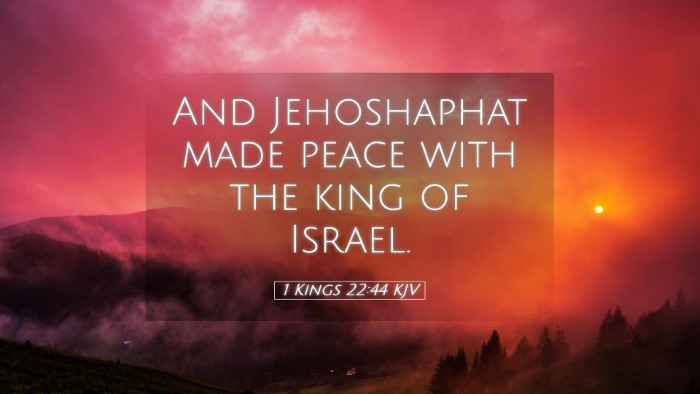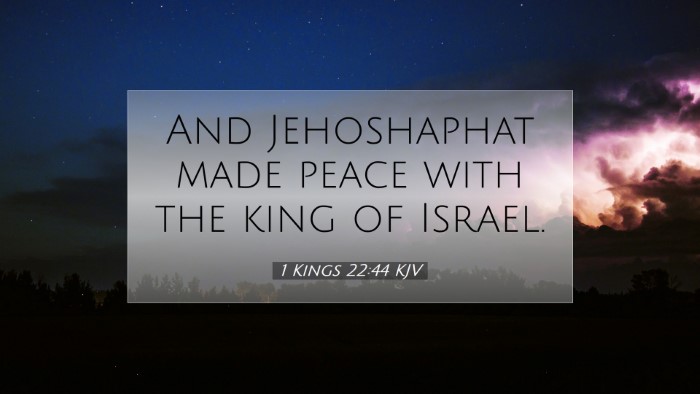Commentary on 1 Kings 22:44
Verse Reference: 1 Kings 22:44
Text: "And Jehoshaphat made peace with the king of Israel."
Introduction
This passage, situated at the conclusion of the accounts of King Ahab of Israel and King Jehoshaphat of Judah, serves as a significant turning point within the narrative of the kings. The mention of Jehoshaphat's peace with the king of Israel is not merely a political statement but has deeper theological implications as well, influencing the future dealings of both kingdoms.
Historical Context
The Kingdoms of Israel and Judah had experienced periods of strife and alliance throughout their histories. Jehoshaphat, described as a good king who sought to follow God’s ways, formed an alliance with Ahab, a king viewed negatively due to his idolatry and rebellion against the Lord. This verse encapsulates the complexities of their relationship and the ramifications of political alliances in biblical history.
Theological Implications
This verse indicates not only the peace made between two monarchs but also highlights the dangers of compromise in spiritual matters. The preceding chapters reveal that Jehoshaphat should have relied on God rather than aligning with Ahab, who was known for his wickedness. The implications of such alliances underscore the need for discernment in the life of faith.
Insights from Commentaries
Matthew Henry's Commentary
Matthew Henry emphasizes the irony of Jehoshaphat’s alliance with Ahab, despite Ahab's known idolatry. He suggests that this peace reflects Jehoshaphat’s failure to fully embrace his role as a leader who points his people towards God. Henry argues that while peace is commendable, when it is achieved through ungodly means, it may lead to further spiritual decline.
Albert Barnes' Notes
Albert Barnes elaborates on the political dynamics of the time, noting that the peace established between Jehoshaphat and Ahab allowed for military collaboration, particularly in the battles against Syria. Barnes points out that Jehoshaphat's decision shows a significant degree of naivety, as he ignored the warnings of the prophets, a theme that resonates throughout the narrative of the kings.
Adam Clarke's Commentary
Adam Clarke focuses on the nature of peace itself, asserting that it must be founded on truth and justice to be genuinely valuable. He warns that alliances made without divine guidance can lead to unrest and turmoil. Clarke further reflects on how Jehoshaphat’s partnership with Ahab eventually had lasting consequences for Judah.
Lessons for Pastors and Theologians
From 1 Kings 22:44, pastors and theologians can draw several practical lessons:
- The Importance of Discernment: Jehoshaphat’s alliance serves as a potent reminder that peace at any cost can lead to spiritual compromise. Leaders must distinguish between diplomatic alliances and those aligned with God’s will.
- Evaluating Leadership Decisions: The outcomes of Jehoshaphat's choices remind church leaders to evaluate the spiritual consequences of their political engagements.
- Understanding the Role of Prophecy: The dismissal of prophetic warnings by Jehoshaphat signifies the need for spiritual leaders to heed God’s messages through His prophets, ensuring they do not stray from divine truth.
- Peace vs. Surface-Level Harmony: It is crucial to understand that genuine peace is rooted in righteousness and justice; otherwise, it may mask underlying conflicts.
Conclusion
1 Kings 22:44 encapsulates a moment of political peace between Jehoshaphat and Ahab, yet it also serves to illustrate the complexities of faithfulness amidst alliances. The commentaries highlight essential truths regarding spiritual integrity, the dangers of compromise, and the necessity of seeking God’s guidance in all matters of life, especially for those in leadership. As we reflect on this verse, may we seek to cultivate peace within our communities, anchored in faithfulness to God’s will rather than the transient agreements of men.


